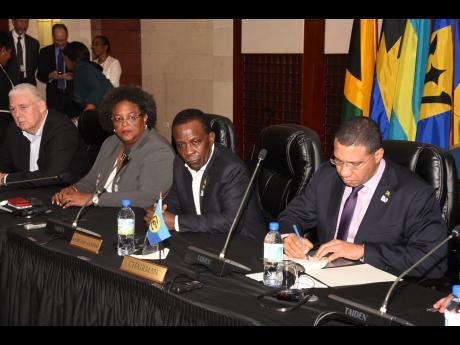Health, education benefits for spouses and dependents of CARICOM nationals
Published:Tuesday | July 10, 2018 | 12:00 AM
Spouses and dependents of Caribbean Community (CARICOM) nationals, who relocate to other member states, will now be entitled to access benefits such as health and education services, which were not previously afforded to them.
This applies to individuals and their families, who move across the region to work, provide services and establish companies within the framework of the free movement regime under the CARICOM Single Market and Economy (CSME).
Jamaica is among six CARICOM countries that have agreed to facilitate the benefits with the signing of the Protocol on Contingent Rights on Friday. The others are Barbados, Haiti, Suriname, St Lucia, and Grenada.
The signing took place on the final day of the 39th Regular Meeting of the Conference of Heads of Government of CARICOM, which was held at the Montego Bay Convention Centre in St James from July 4 to 6.
Addressing a press conference after the signing, Prime Minister and CARICOM chairman, Andrew Hotness, said the move is a crucial step in making CARICOM more functional and relevant to the people of the region.
"This is a matter that has been long outstanding and is a major step that should encourage greater use of the free movement regime as it ensures a greater level of comfort and peace of mind for families," he said.
Barbadian Prime Minister, Mia Mottley, welcomed the initiative, describing it as a fundamental development since the introduction of the CSME.
"For this protocol to have been signed today is the most significant event in the history of Caribbean affairs since the single market was signed here in Jamaica and came into effect here in Jamaica 2006," she said.
The CSME is an integrated development strategy, which is intended to benefit the people of the region by providing more and better opportunities to produce and sell goods and services and to attract investment.
It is built on five core regimes: free movement of capital, free movement of goods, free movement of skills, the provision of services, and the right of establishment. In addition, the CSME facilitates hassle-free travel for all CARICOM nationals.

